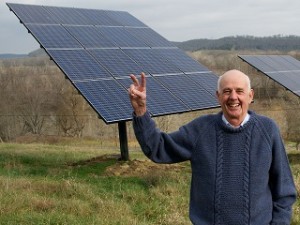Solar Saves Lives

Great stuff. It’s gratifying to read articles like this, which make a point so important and so obvious that it may often be overlooked: renewable energy saves lives. What you say here is completely correct; I would only add that in the calculations re: coal, the authors also should have included a quantification of the effects of other toxic metals, e.g., cadmium, selenium and arsenic, not to mention radioactive isotopes.
Over one million people die each year from breathing the emissions from coal plants, over 13,000 in the U.S. alone. That’s a lot of suffering, and thus a significant impetus for change.

I was at a meeting recently where I was asked my social/political perspective. Complicated… A conservative social argument that sounds a lot like “survival of the fittest” was advocated. Why try to “save” the environment? Why provide health care? Why try to reduce pollution? Are these things even “natural?” Aren’t they just providing a selection process?
Craig, your extolling the benefits of eliminating any type of pollution or other environmental harm may seem fundamental to some, but there is also this alternate perspective that has a subtle backing, especially as it is used by a business view of the world.
I found myself countering that even in nature there are communities that work cooperatively. A corporation is itself a kind of cooperative effort. For many there is a theological dogma that advocates looking after others.
But perhaps most of all, the concept of an individual separate is a simplistic fiction. While polluted air, water and land may impact the poor more heavily than those with economic advantages, the harm to the weakest part of our society is like the proverbial “canary in a coal mine.” Diseases may start in the weak part of society but once incubated there they can spread.
From this “self serving” perspective environment concerns, pollution controls, and health care may be viewed as a method of self preservation.
In poor communities in the developing world, off grid solar power is already saving lives in increasing numbers.
Imaging you are giving birth at night in a remote mud hut in the African bush with no electricity. Consider complications, and only candles and kerosene for light. You are lucky, a local birth attendant with basic training is able to attend but she cant see what she is doing – What are your chances and those of your baby?
Just then, a neighbor turns up with a re-chargeable head torch that she charges with a solar panel – the birth attendant can now see to deliver your baby. You bleed heavily and the birth attendant is not sure what to do. The same neighbor with the head torch uses her mobile phone also charged with the solar panel to call a doctor who advised the birth attendant on the best way to stop the bleeding, then makes another call to arrange transport to the nearest clinic for follow up care.
Think this doesn’t happen? I read an account of a US based doctor of Nigerian heritage who visited a large maternity hospital in Northern Nigeria. The power was off, and in a single night, 5 mothers died who could in all probability have been saved if electricity had been available. My guess is that those suitcases have helped a lot of people.
http://wecaresolar.org/solutions/we-care-solar-suitcase/
Her husband who was an engineer then built some “solar suitcases” equipped with lights, battery chargers for AAA and AA cells, and a few basic medical devices. Not a full solution, but a hell of a lot better than no electricity. The system has now been widely deployed in many places in the developing world.
Other effects of making a basic electricity supply available for the first time include a huge boost to education (greatly boosting neonatal survival of educated mothers), as well as improved communication, health as people are able to see clearly at night without worrying about the cost of fuel, of the health effects of the fumes given off.
Wonderful point. I’m embarrassed that I didn’t mention it, especially insofar as I’m constantly beating the drum re: educating women in the third world, and the role that energy plays in that enterprise.